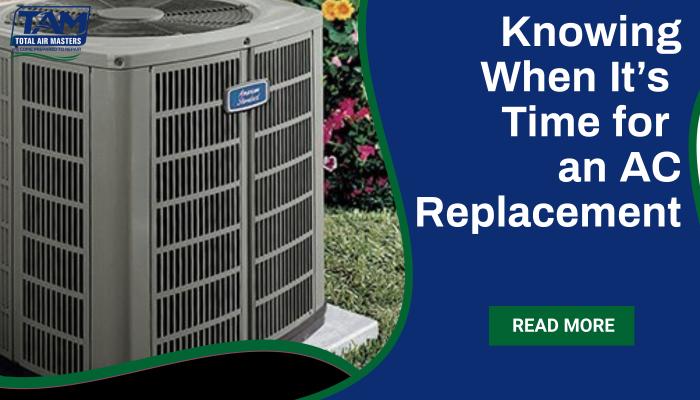
As your local AC company, we understand that your home’s comfort and energy efficiency rely heavily on a well-functioning air conditioning system. While regular AC maintenance, tune-ups, and repairs are crucial to maintaining optimal performance, there comes a time when an AC replacement is the most practical solution. Knowing when to replace your air conditioner is essential to continuing to enjoy energy efficiency, cost savings, and consistent comfort in your home.
In this article, we will explore the various signs and factors that may indicate it’s time to consider an AC replacement, such as the age of the unit, rising energy bills, and the frequency of repair needs. We will also touch upon the benefits of upgrading to a more energy-efficient air conditioner, how it can improve your home’s comfort and the long-term cost savings associated with a new system. Our goal is to provide insight and guidance to help you make informed decisions regarding your air conditioning needs.
As homeowners ourselves, we know that replacing your AC system may seem overwhelming or even daunting. However, understanding the signs that it’s time for an AC replacement can ensure that you maximize your current system’s lifespan while preparing for the future. Let’s dive into the factors that can help you determine when an AC replacement is necessary and how a new, efficient system can contribute to improved comfort and energy savings in your home.
Recognizing the Signs that Indicate an AC Replacement is Necessary
Evaluating Your Air Conditioner’s Age
One of the primary factors to consider when determining if it’s time for an AC replacement is the age of your system. Most air conditioners have a lifespan of approximately 15-20 years, depending on the frequency of use, maintenance, and the system’s quality. If your current air conditioner is approaching or has surpassed this age range, it may be time to explore replacement options. An older system is more likely to experience frequent breakdowns and decreased efficiency, leading to higher energy bills and reduced comfort.
Noticing Rising Energy Bills
A significant increase in your energy bills may signal that your air conditioner is no longer operating efficiently – a common issue with aging systems. As AC units age, their efficiency declines, which can lead to an uptick in energy consumption and monthly expenses. If you notice a consistent spike in your energy bills despite regular maintenance and repairs, it may be time to consider replacing your system with a more energy-efficient model.
Frequency of AC Repairs
Another indicator that it might be time for an AC replacement is if your system requires frequent repairs. Constantly needing repairs not only disrupts your home’s comfort but can also lead to substantial costs over time. If you find yourself regularly calling for AC repair services, it might be more cost-effective to invest in a new air conditioning system.
Inconsistent Temperature and Comfort Levels
An air conditioner’s primary function is to maintain consistent and comfortable temperature levels inside your home. If you’re experiencing uneven cooling, hot and cold spots, or a general decline in your home’s comfort levels, this could be a sign that your system is no longer capable of adequately cooling your living space. Upgrading to a new AC unit can help restore your home’s comfort by providing consistent, even cooling throughout your residence.
Understanding the Benefits of Upgrading to a More Energy-Efficient AC System
Lower Energy Bills
One of the most significant advantages of upgrading to a new, energy-efficient air conditioner is the potential to lower your energy bills. Newer systems utilize advanced technology and are designed to operate more efficiently than their older counterparts. This increased efficiency translates to reduced energy consumption and, subsequently, lowered monthly utility expenses.
Improved Comfort Levels
A new AC system is more capable of providing consistent temperature control and improved air circulation, creating a more comfortable living environment. Furthermore, advanced air filters in newer systems can effectively remove pollutants, reduce allergens, and enhance your home’s indoor air quality.
Reduced Environmental Impact
With advancements in energy efficiency, modern air conditioners are designed to consume less energy and produce fewer greenhouse gas emissions. By upgrading to a more energy-efficient system, you can reduce your environmental impact and contribute to a greener future.
Warranty Coverage and Peace of Mind
New air conditioning systems typically come with warranty coverage, providing additional protection and peace of mind for homeowners. A manufacturer’s warranty can cover various components and services, helping to mitigate the costs of any unexpected repairs or replacements within the warranty period.
Choosing the Right AC Replacement for Your Home
When it’s time to replace your air conditioner, you might be wondering how to select the best system for your home. Factors to consider include the size and layout of your living space, your local climate, your home’s insulation, and your desired level of energy efficiency. It’s important to consult with experienced professionals to ensure that you choose the ideal AC unit tailored to your specific requirements and preferences.
Making an Informed Decision for Your Home’s Comfort
Deciding when to replace your air conditioner is a crucial decision that impacts your home’s comfort, energy efficiency, and long-term cost savings. By understanding the signs that indicate an AC replacement is necessary and considering the numerous benefits of upgrading to an energy-efficient system, you can make an informed choice that maximizes both comfort and value.
If you believe it’s time for an AC replacement or have questions about your air conditioning needs, contact Total Air Masters. Our team of professionals is ready to provide expert advice and guide you through the process of selecting and installing the ideal AC system for your home. Don’t wait to experience a more comfortable and energy-efficient living environment – reach out to our team today.
